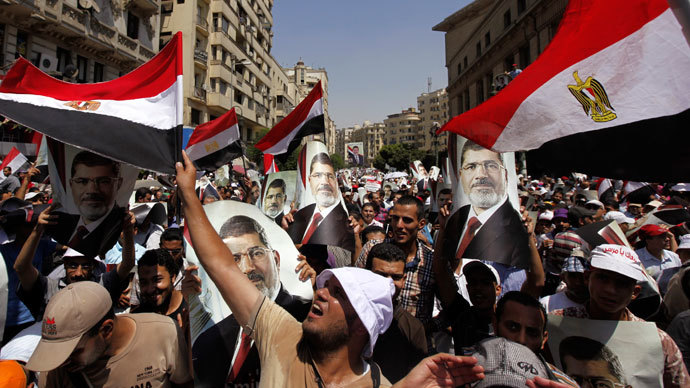
Egyptian security officials and members of the Muslim Brotherhood said that more than 40 supporters of deposed President Mohamed Morsi were killed as violence erupted outside a military officers’ club early Monday where the supporters had been holding a sit-in for days demanding his release from detention.
A spokesman for the Muslim Brotherhood said the supporters were killed by soldiers and police officers during an “unprovoked” attack during dawn prayers using tear gas and live ammunition.
Security officials said the death toll stood at 43 civilians and one security officer. They added that more than 300 people had been wounded.
Al Jazeera broadcast footage of a field hospital run by Mr. Morsi’s supporters, showing what appeared to be several bodies lying on the ground and doctors treating bloodied patients. Army tanks blocked approaches to the officers’ club, as well as another square nearby where the field hospital was located.
Witnesses in the area where the shooting took place said they saw Mr. Morsi’s supporters performing the dawn prayers. Shortly afterward, the witnesses said, they heard the sound of heavy automatic weapons and pro-Morsi supporters were seen fleeing frantically, seeking to take cover behind debris on the streets and billboards.
It was the second explosion of deadly violence outside the Republican Guard officers’ club since the military intervened on Wednesday to depose Mr. Morsi, following mass protests against his rule. Mr. Morsi’s supporters believe the former president is being held inside the club, and have held rallies at its gates, demanding his release.
The killings came a day after the Muslim Brotherhood and its allies vowed to broaden their protests against the president’s ouster and American diplomats sought to persuade the Islamist group to accept his overthrow, its officials said. But the killings on Monday seemed certain to inject perilous new factors into the country’s fragile political calculus.
Continuing a push for accommodation that began before the removal of Mr. Morsi last week, the American diplomats contacted Brotherhood leaders to try to persuade them to re-enter the political process, an Islamist briefed on one of the conversations said on Sunday, speaking on the condition of anonymity to discuss private conversations.
“They are asking us to legitimize the coup,” the Islamist said, arguing that accepting the removal of an elected president would be the death of Egyptian democracy. The United States Embassy in Cairo declined to comment.
Even as both sides continued their street demonstrations on Sunday, Egypt’s new leaders continued their effort to form an interim government. Squabbles about a choice for prime minister spilled out into the open on Saturday, exposing splits among the country’s newly ascendant political forces.
State news media quoted a spokesman for Adli Mansour, the interim president, on Sunday as saying there was a “tendency” to name Mohamed ElBaradei, a Nobel Prize-winning diplomat, as vice president, and a former chair of Egypt’s investment authority, Ziad Bahaa el-Din, as interim prime minister.
On Saturday, state news media said Mr. ElBaradei had been chosen as prime minister, but the presidency later backed away from the report after ultraconservatives known as Salafis, who fault Mr. ElBaradei for being too secular, apparently rejected the appointment. It was not clear on Sunday that the Salafi party, Al Nour, was any more inclined to accept Mr. ElBaradei as vice president.
Mr. Bahaa el-Din, a lawyer who served in the investment authority and on the board of the Central Bank under former President Hosni Mubarak, was abroad and was considering the request, according to a spokesman for his political party, the Egyptian Social Democratic Party.
The lack of agreement means that Egypt has been without a fully functioning government since Wednesday, when the defense minister, Gen. Abdul-Fattah el-Sisi, announced that Mr. Morsi had been deposed.
The power vacuum has left confusion about who is responsible for making decisions in the interim, and in particular for law enforcement. Over the past few days, the authorities have arrested Muslim Brotherhood officials and shut down television stations, including Islamist channels, though it is not clear on whose orders the security services were acting.
On Sunday, Al Jazeera reported that prosecutors had interrogated its Cairo bureau chief, Abdel Fattah Fayed, for hours before releasing him on bail.
Source:Agencies












